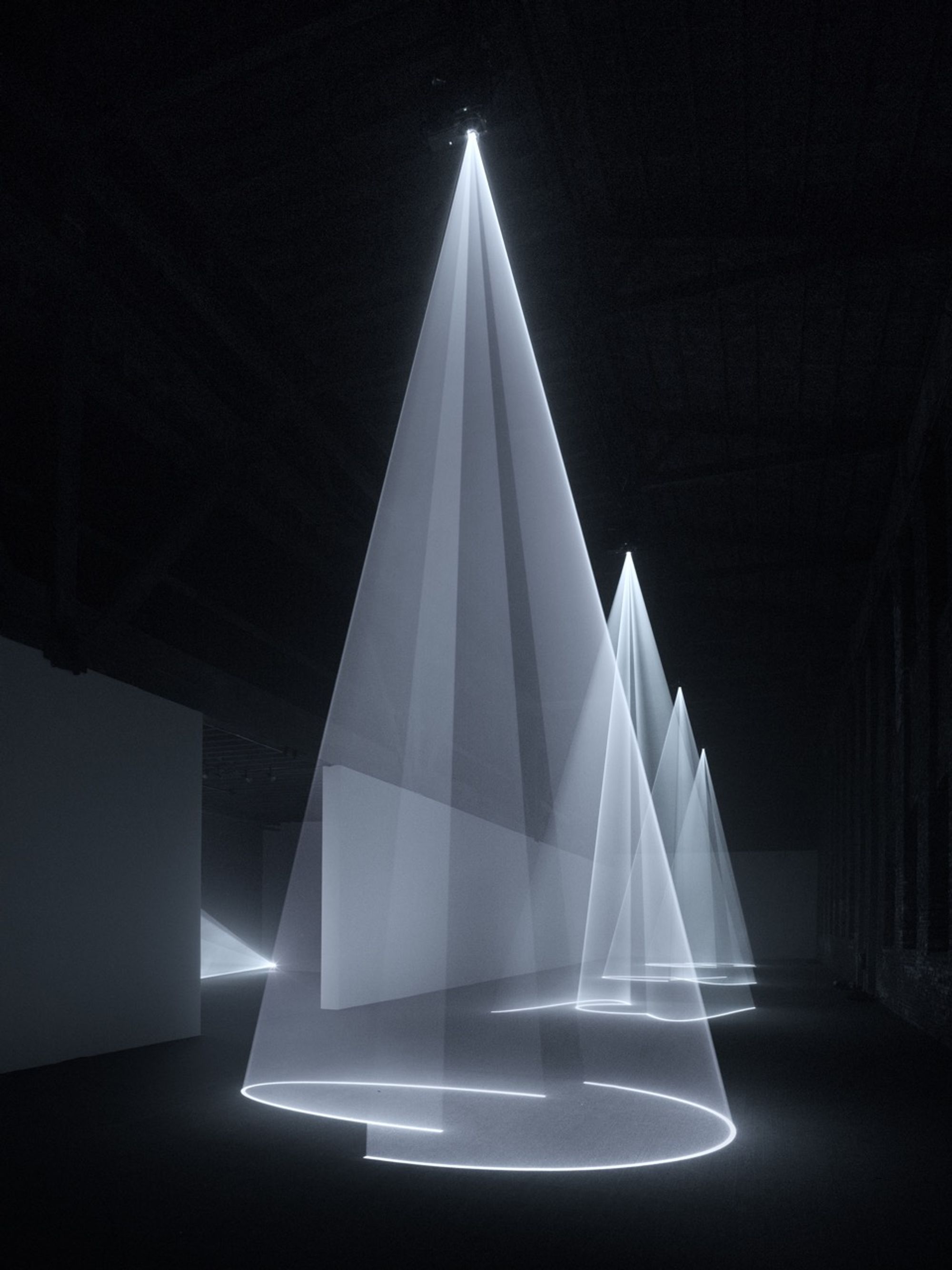
The Shape of Space: Anthony McCall’s Solid Light Works
Anthony McCall’s sculptural works explore the intersections of light, movement, drawing and space, forming evanescent and ever changing three-dimensional forms that exist not only as “objects” in space, but as environments to experience. This panel discussion will consider the artist’s ‘solid light’ films and projections in relation to his own artistic career, as well as within the context of historical and contemporary developments in drawing, sculpture and cinema. Participants will include Anthony McCall; Johanna Gosse, Visiting Assistant Professor and CWCTP Scholar, University of Colorado, Boulder; Ed Halter, Director of Light Industry, Brooklyn; Branden W. Joseph, Frank Gallipoli Professor of Modern and Contemporary Art, Columbia University; and Melissa Ragona, Associate Professor of Visual Culture and Critical Theory, Carnegie Mellon University. This program has been organized in conjunction with the exhibition Solid Light Works, on view through March 11.
Anthony McCall is known for his ‘solid-light’ installations, a series that he began in 1973 with his seminal Line Describing a Cone, in which a volumetric form composed of projected light slowly evolves in three-dimensional space. The historical importance of McCall’s work has been recognized in such exhibitions as Into the Light: the Projected Image in American Art 1964-77, Whitney Museum of American Art (2001-2); The Expanded Screen: Actions and Installations of the Sixties and Seventies, Museum Moderner Kunst, Vienna (2003-4); The Expanded Eye, Kunsthaus Zurich (2006); Beyond Cinema: the Art of Projection, Hamburger Bahnhof, Berlin (2006-7); The Cinema Effect: Illusion, Reality and the Projected Image, at Hirshhorn Museum, Washington DC (2008); and Dreamlands, Whitney Museum of American Art (2017). His work has also been shown at the Centre Pompidou, Paris; MoMA New York; SFMoMA; Hamburger Bahnhof, Berlin; Serpentine Gallery, London; Tate Modern, London; EYE Film Museum, Amsterdam; Moderna Museet, Stockholm; Hangar Bicocca, Milan; Lugano Arte e Cultura; Fundacio Gaspar, Barcelona, among others.
Johanna Gosse is a historian of modern and contemporary art specializing in experimental film & media. She received an Arts Writers Grant from the Creative Capital/Andy Warhol Foundation in 2015 for her current book project, which examines the work of American artist Ray Johnson through the lens of network aesthetics. Her writing appears in journals such as Camera Obscura, Millenium Film Journal, Art Journal, Oxford Art Journal, MIRAJ, and Radical History Review, in the exhibition catalogue for the 2016 retrospective, Bruce Conner: It’s All True, and in various edited collections. She is currently a Visiting Assistant Professor at the University of Colorado, Boulder.
Ed Halter is a writer and curator living in New York City. He is a founder and director of Light Industry, a venue for film and electronic art in Brooklyn, New York, and Critic in Residence at Bard College. His publications include From Sun Tzu to Xbox: War and Video Games (2006), Mass Effect: Art and the Internet in the 21st Century (2015, with Lauren Cornell), From the Third Eye: The Evergreen Review Film Reader (2018, with Barney Rosset), and over two decades of writing for 4Columns, Artforum, the Village Voice and elsewhere. He’s organized screenings and related programs for Artists Space, the Flaherty Film Seminar, the Museum of Modern Art, Tate Modern, the Walker Art Center, and the 2012 Whitney Biennial. In 2017, he published a catalog essay on Anthony McCall’s work, entitled “Objects and Events,” for McCall’s exhibition at Lismore Castle Arts, Ireland.
Branden W. Joseph is the Frank Gallipoli Professor of Modern and Contemporary Art at Columbia University and a founding editor of the academic journal Grey Room. He is author of Anthony McCall: The Solid Light Films and Related Works (2005), the first comprehensive monograph on the artist, as well as the books: Random Order: Robert Rauschenberg and the Neo-Avant-Garde (2003), Beyond the Dream Syndicate: Tony Conrad and the Arts after Cage (2008), The Roh and the Cooked: Tony Conrad and Beverly Grant in Europe (2012), and Experimentations: John Cage in Music, Art, and Architecture (2016). He is also the editor of Kim Gordon’s selected writings, Is It My Body? (2014), and Carolee Schneemann, Uncollected Texts (2018), as well as consulting curator, with Sabine Breitwieser, of the retrospective exhibition, Carolee Schneemann: Kinetic Painting, at MoMA/PS1 through March 11.
Melissa Ragona is an Associate Professor of Critical Theory and Art History in the School of Art at Carnegie Mellon University. Her book, Readymade Sound: Andy Warhol’s Recording Aesthetics, is forthcoming from University of California Press and her essays and reviews have appeared in October, Frieze, Art Papers and in the edited collections Women’s Experimental Cinema (2007), Lowering the Boom: Critical Studies in Film Sound (2008), Andy Warhol Live (2008), Oxford Handbook of Sound and Image (2013), Paul Sharits (Retrospective Catalog, Fridericianum, Kassel) (2015), Carolee Schneemann: Unforgivable (London: Black Dog Publishing, 2016) and Sculpture and Film (Subject/Object: New Studies in Sculpture) (London: Ashgate Press, 2017). She has also published in monographs on the work of artists, Heike Mutter, Ulrich Genth, Christian Jankowski, Carolee Schneemann, Paul Sharits, and Antoine Catala. She has lectured on experimental film, sound, performance and installation at Yale University, Princeton University, Tate Modern in London, the Museum of Modern Art (MoMA) in New York, Freie Universität Berlin, as well as The Academy of Fine Arts (KUVA) in Finland, and other venues both nationally and internationally.